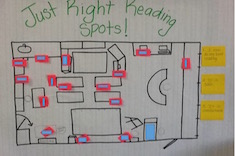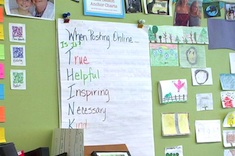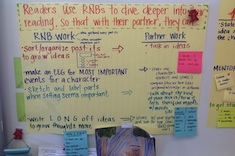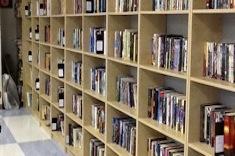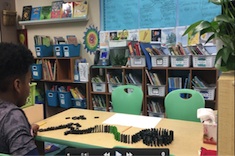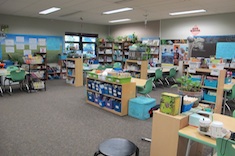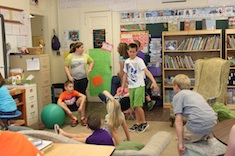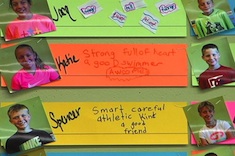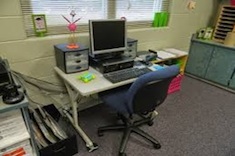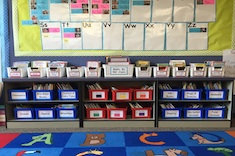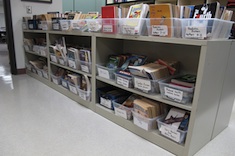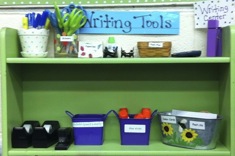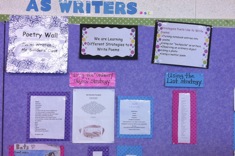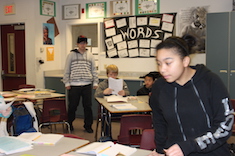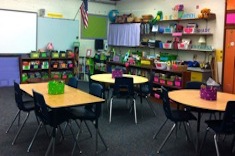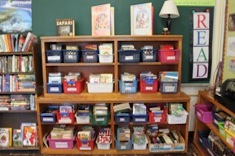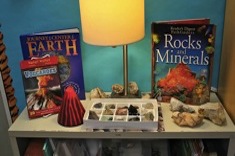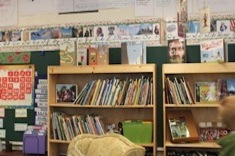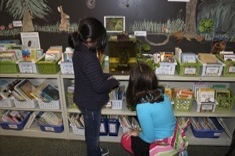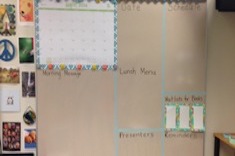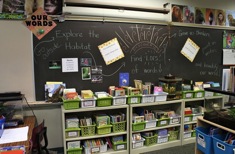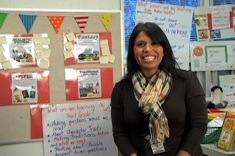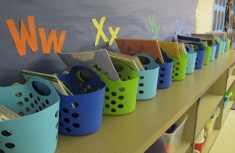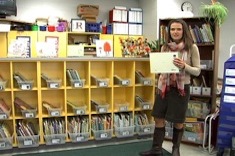Classroom Design
There's been a remarkable amount of brain research demonstrating how crucial environments are for learning. Cozy, well-lit and well-organized spaces are essential for literacy learners of any age. The constraints teachers face in designing and organizing their classrooms are enormous -- from irritated fire marshals to fear of lice infestations, with limited budgets always at the forefront. You'll be inspired by these beautiful classrooms, created by teachers who manage to design spaces any reader or writer would love.
Latest Content
Visual Expectations in the Classroom
Heather Fisher finds the key to independence for many first graders is lots of visual reminders in classrooms.
Guidelines for Posting Online
Katherine Sokolowski describes a wall display with guidelines to ensure students are respectful and aware of the pitfalls of posting online.
Charts as Tools, Charts as Teachers
Tara Barnett and Kate Mills give three principles they use to help avoid the “charts as wallpaper” syndrome in their fourth-grade classroom.
Superpowers and a Middle School Classroom Library
Christy Rush-Levine explains how she gradually stocked her middle school classroom library, as well as how she uses student librarians to ensure books aren’t lost.
Introducing the Classroom Library
Andrea Smith shares a sequence of lessons she uses to introduce the classroom library to her fourth-grade students.
Prepping the Meeting Area for Success
Tara Barnett and Kate Mills describe how they set up their meeting area with the right supplies to build community and student independence.
Who Owns the Room?
Katherine Sokolowski considers how classroom design says a lot about the relationship between students and teachers.
Student Interest Board
Katherine Sokolowski shares a wall display from her fifth graders that students build to celebrate who they are and people they love from home.
Life Without the Big Teacher’s Desk
Are you contemplating the removal of your teacher desk this year? Shari Frost has suggestions for how to manage and house teaching materials you will need without a teacher desk.
Creating a Space for Peace
At a time of escalating violence throughout the world, children need peaceful spaces. Katie DiCesare creates a "peace table" in her first-grade classroom as a safe place for working through everything from playground squabbles to emotional distress.
Student-Centered Room Setup
Tara Barnett and Kate Mills describe the principles they use to design a student-centered classroom.
Gradual Release of the Library
Bitsy Parks explains how she designs her first-grade classroom library for “gradual release” throughout the school year in a way that allows students to build book-browsing skills.
Adjusting the Classroom Library for Student Needs
Mandy Robek realizes her classroom library isn’t working for her second graders, in part because many of the books are still too difficult for students early in the year. She explains her process of sorting and stowing books for later use.
Reorganizing the Classroom Library
Gigi McAllister reorganizes her classroom library checkout system, and finds that a little upfront investment in time pays big dividends all year long.
Reorganizing Primary Information Texts
Katie DiCesare thinks about the needs of her first-grade students, and spends some time reorganizing primary information texts, considering both physical texts for the library and online resources.
Classroom Environment: Access to Supplies
Melanie Swider believes access to supplies is crucial for student independence, and she even has students in charge of monitoring and replenishing materials. This is the final installment in Melanie's classroom environment series.
Classroom Environment: Bulletin Boards
Melanie Swider shares her favorite bulletin boards, another installment in her classroom design series.
Beyond Cute: Print Rich with Purpose
Shari Frost cautions against overly stylized text in wall displays.
Creating a Classroom Environment That Supports Community Building and Independence
Melanie Swider shares how classroom design is linked to community building.
Curating a Classroom Library
Katherine Sokolowski explains why it is important to sort and weed out books carefully before the new year begins.
Classroom Environment: Classroom Libraries
Melanie Swider looks at classroom library design as part of her classroom environment series.
The Power of Charts in the Classroom
Melanie Swider shares suggestions for making anchor charts more purposeful.
Classroom Displays for Nonfiction Learning
Andrea Smith shares some of her favorite nonfiction classroom displays.
Reorganizing the Classroom Library
Katherine Sokolowski looks at challenges from the previous year for ideas on reorganizing the classroom library.
Inviting Book Tub Titles: Nonfiction Library Redesign
Andrea Smith discovers the value of more creative nonfiction book tub titles after listening to ideas from her students.
Community Board: Invitations to Independence
Students transition between home and school with the Community Board in Andrea Smith’s classroom. It’s a lively bulletin board that is updated and discussed daily in her fourth-grade classroom.
Helping Allison Redesign Her Classroom Nonfiction Library
Andrea Smith shares her best advice for library design that celebrates nonfiction as much as fiction.
A Classroom for Elementary English Language Learners
Stella Villalba gives a tour of her classroom library and publishing corner designed to support the grades 1-5 English language learners she works with daily.
Effective Organization
Ruth Ayres has tips for organizing desks, tables, chairs, and materials to support literacy learning.
Room Tour: Mandy Robek’s Kindergarten Classroom
Mandy Robek gives a tour of her kindergarten classroom, highlighting literacy spaces that build relationships and independence for her young learners.
Browse Content By
Type
Category
- Assessment Tools
- Big Fresh Archives
- Booklists
- Choice Numeracy
- Classroom Design
- Common Core
- Community Building
- Conferring
- Content Literacy
- Digital Literacy
- English Language Learners
- Equity
- Family Relations
- Free Samples
- Guiding Groups
- Leadership
- Literacy Coaches
- Mentor Texts
- Minilessons
- New Teacher Mentors
- Podcasts
- Poetry
- Quote Collections
- Reading Strategies
- Self Care
- Struggling and Striving Learners
- Talking and Listening
- Teacher Study Groups
- Teaching Reading
- Teaching Writing
- Word Study and Vocabulary
Author
- Melissa Quimby
- Nawal Qarooni
- Gwen Blumberg
- Julie Cox
- The Lead Learners
- Hannah Tills
- Josie Stewart
- Ruth Metcalfe
- Mallory Messenger
- Becca Burk
- Jodie Bailey
- Vivian Chen
- Mary Brower
- Tiffany Abbott Fuller
- Stephanie Affinito
- Ruth Ayres
- Leigh Anne Eck
- Heather Fisher
- Shari Frost
- Julie Johnson
- Suzy Kaback
- Gigi McAllister
- Shirl McPhillips
- Melanie Meehan
- Cathy Mere
- Debbie Miller
- Tara Barnett and Kate Mills
- Tammy Mulligan
- Dana Murphy
- Bitsy Parks
- David Pittman
- Brenda Power
- Heather Rader
- Matt Renwick
- Mandy Robek
- Christy Rush-Levine
- Gretchen Schroeder
- Jen Schwanke
- Brian Sepe
- Katherine Sokolowski
- Stella Villalba
- Jennifer Vincent
Grade Level
Choice Literacy Membership
Articles
Get full access to all Choice Literacy article content
Videos
Get full access to all Choice Literacy video content
Courses
Access Choice Literacy course curriculum and training

